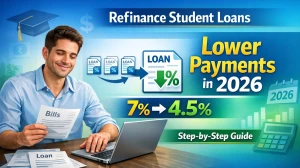
What is No Document Business Loans? How to Apply for No Doc Business Loans?
A No Document Business Loan provides swift funding for business owners without the usual extensive paperwork, potentially with higher interest rates or stricter repayment terms.
by Sai V
Published Aug 28, 2023 | Updated Aug 28, 2023 | 📖 11 min read
On This Page
- What is No Document Business Loans?
- How to Apply for No Doc Business Loans?
- No Paperwork Business Loans
- What is the Functioning Process of No-doc Business Loans?
- What Are the 4 Types of No-doc Business Loans?
- What Are the Advantages and Disadvantages of Business Loans Without Documentation?
- Is a No-doc Business Loan Worth Considering?
- How Can One Obtain a No-doc Business Loan?
What is No Document Business Loans?
A No Document Business Loan refers to a financing option designed for business proprietors to acquire funds without the necessity of providing extensive paperwork that is typically demanded by conventional bank loans. These conventional loans usually require the submission of a range of documents, such as personal and business financial statements, business licenses, past loan application records, tax returns, and assorted forms of information.
No document business loans present a swiffer route for borrowers to access credit without undergoing the protracted process of assembling and submitting comprehensive documentation as mandated by traditional lenders. These loans can potentially offer rapid capital access, often within as little as one business day from the point of application. Nonetheless, it's important to acknowledge that these expedited loans may carry elevated interest rates or more stringent repayment conditions due to the reduced emphasis on documentation requirements.
How to Apply for No Doc Business Loans?
Applying for No-Doc Business Loans:
No-doc business loans represent a form of financing that requires only a limited amount of paperwork when applying. Generally provided by online lenders, these loans establish a connection to your business accounts, sidestepping the necessity for comprehensive documents such as financial statements or tax returns. The key criterion for the application is the submission of your business bank statements.
Choose a Lender:
- Look for reputable lenders that specialize in no-doc business loans.
- Online platforms like Lendio, OnDeck, National Business Capital, Bluevine, and BusinessLoans.com are among the options in 2023.
Prequalification:
- Begin by prequalifying for a loan on the lender's website.
- Provide basic business information and details about your revenue.
Connect Business Accounts:
- Instead of extensive paperwork, these lenders use technology to connect to your business bank accounts.
- This step gives them insight into your business's financial health and transaction history.
Review Loan Options:
- After connecting your accounts, you'll receive information about the loan options you might qualify for.
- Compare terms, interest rates, and repayment terms from different lenders.
Application Submission:
- Choose the lender and loan option that suits your business's needs.
- Complete the application process on the lender's platform.
- Provide any additional information or documents requested by the lender.
Approval and Funding:
- The lender will review your application and may request further details if needed.
- If approved, you'll receive the loan offer, including the terms and conditions.
- Upon accepting the offer, the funds will be disbursed to your business account, often within a short time frame.
No Paperwork Business Loans
No Paperwork Business Loans," also known as "No-Doc Business Loans," offer entrepreneurs a streamlined way to access capital quickly without the burden of extensive documentation usually required by traditional loans. These loans simplify the application process by reducing the paperwork needed for approval. While they still necessitate some proof of revenue and credit history, lenders primarily base their decisions on factors like customer credit history and collateral. Consequently, these loans provide rapid processing times and increased accessibility, particularly for those with lower credit scores or limited financial histories, making them an appealing choice for swift business funding.
However, it's important to note that no-paperwork business loans often come with higher interest rates due to the added risk for lenders. Additionally, the repayment terms are typically shorter, requiring borrowers to repay the loan quickly. Entrepreneurs should weigh the advantages and disadvantages of these loans, considering their financial situation and repayment capacity, before choosing this financing option.
What is the Functioning Process of No-doc Business Loans?
No-documentation (no-doc) business loans operate by catering to business proprietors who encounter hurdles when seeking financial support through conventional banking channels. These specialized loans offer entrepreneurs the chance to secure funds rapidly and with less paperwork than what is typically demanded by traditional loans.
When applying for a no-doc business loan, lenders typically request only essential details such as personal identification records and evidence of earnings or business revenue. Additionally, applicants might be asked to execute an asset security agreement, enabling the lender to employ assets as collateral to ensure repayment if the borrower defaults on their obligations. This arrangement diminishes the inherent lending risk, which in turn empowers lenders to extend no-doc loans with more favorable interest rates.
What Are the 4 Types of No-doc Business Loans?
No-document business loans are a swift means for business proprietors to obtain funds without the need for exhaustive documentation during the loan application process. While completely documentation-free business loans are rare, there exist financing alternatives with less stringent application prerequisites compared to traditional loans.
Immediate Business Loans:
These loans cater to pressing cash flow necessities, like covering inventory expenses or payroll obligations. Typically repaid within three months to three years, these loans bear higher interest rates compared to prime small business loans—often ranging from 7% to 50%. Due to their abbreviated repayment durations, these loans often come with substantial monthly payments that might pose challenges in repayment. Employing a business loan calculator aids in determining a suitable borrowing amount before committing to the loan terms.
Merchant Cash Advances (MCAs):
MCAs represent another form of short-term financing offering swift access to working capital for immediate requirements. Unlike conventional lenders, MCA providers don't heavily rely on credit scores to evaluate applicants. Instead, they employ the business's credit card sales volume as collateral and recover repayments from future sales proceeds. Repayments are typically debited daily from the merchant's account. Interest accrues based on a factor rate, generally ranging between 1.2 to 1.5. MCAs are most advantageous for enterprises with substantial sales volume, capable of repaying loans promptly.
Revolving Business Credit Lines:
These are open-ended loans permitting businesses to withdraw from an approved limit when necessary. Businesses can employ these credit lines for continual and extended cash requirements such as procuring equipment or financing marketing endeavors. Interest rates for revolving credit lines are typically lower than those for immediate loans, commencing at around 3%. Critically, interest is levied only on the utilized balance, not the entire credit line.
Invoice Financing:
This type of minimal or no-document business loan empowers businesses to swiftly acquire funds based on the value of pending invoices. Lenders issue a portion of the invoice value upfront often up to 90% and recover repayment alongside interest once the customer fulfills the invoice. However, fees for invoice financing are typically assessed weekly and can culminate in annual percentage rates (APRs) as high as 79%. Rather than assessing lending decisions based on the business owner's credit, invoice financing entities scrutinize the payment track record of the business's clientele. This loan variant is particularly advantageous for swiftly accessing capital without a robust credit history and without waiting for customers to settle their outstanding invoices."
What Are the Advantages and Disadvantages of Business Loans Without Documentation?
Business loans without documentation, commonly known as no-doc loans, offer both benefits and drawbacks for borrowers. These loans stand out due to their streamlined paperwork process and relaxed qualification criteria, but understanding their pros and cons is crucial before committing to debt.
Advantages of Business Loans Without Documentation:
- Swift Processing: No-doc loans are prized for their expedited approval process. The minimal paperwork requirement results in quicker processing compared to conventional loans.
- Accessible Qualifications: These loans often emphasize a business's assets rather than its historical income. This opens the door for borrowers with lower credit scores or less robust financial records to secure approval more easily.
- Compact Repayment Periods: Business loans without documentation usually come with shorter repayment terms. This allows business owners to settle the debt sooner, reducing the overall interest burden.
- Enhanced Flexibility: By eliminating the need for extensive documentation and collateral, no-doc loans provide businesses with more flexibility to access larger capital amounts, catering to their funding needs.
Disadvantages of Business Loans Without Documentation:
- Elevated Interest Rates: The reduced qualification requirements and higher risk associated with these loans lead to lenders imposing higher interest rates compared to conventional financing options.
- Brief Repayment Windows: No-doc loans typically come with condensed repayment periods. This obliges businesses to repay the loan promptly, potentially resulting in increased overall interest and fees if terms are not met.
- Limited Lender Choices: Due to the specialized nature of no-doc loans, the options for lenders providing these products might be restricted. This limitation can impede a borrower's ability to shop for the most favorable terms.
- Constrained Capital Access: Businesses seeking substantial funding might find business loans without documentation inadequate, as they often do not provide access to significant capital amounts.
Is a No-doc Business Loan Worth Considering?
This type of loan suits situations where your credit or business history isn't strong enough for traditional financing, often with higher interest rates and shorter repayment terms. If you need quick capital, have credit challenges, lack a solid financial history for standard loans, or require short-term funds for equipment or marketing, a no-doc loan could be an option, provided your business can manage shorter repayment periods.
Assessment of No-Doc Business Loans:
- This point addresses the initial inquiry of whether a no-doc business loan is a viable option worth considering. It acknowledges the need for a thorough evaluation before making a decision.
- It suggests that you're at the stage of gathering information and understanding the basics of what a no-doc loan entails.
Exploring the Value of No-Doc Loans:
- Here, the focus is on a deeper investigation into the potential benefits that come with choosing a no-doc business loan. This entails delving into the advantages that might be associated with this particular financing approach.
- The idea is to explore whether this type of loan could offer specific advantages or unique value propositions that cater to your business's needs.
Contemplating the Suitability of No-Doc Financing:
- This point emphasizes the importance of considering how well a no-doc business loan aligns with your specific financial requirements and circumstances.
- It encourages thoughtful reflection on whether this financing option matches your business's needs and objectives, taking into account factors such as urgency, credit history, and funding purpose.
Evaluating the Viability of No-Doc Loans:
- This point goes beyond basic exploration and delves into a more comprehensive evaluation. It suggests a more detailed analysis of the practicality and potential challenges associated with opting for a no-doc business loan.
- The idea is to assess whether the advantages outweigh the drawbacks, considering factors like interest rates, repayment terms, and overall feasibility.
Analyzing the Practicality of No-Doc Business Loans:
- This point highlights the need for a thorough review of your business's specific situation and how a no-doc loan would fit within it.
- It prompts a closer look at how this financing option aligns with your financial goals, whether it solves immediate cash needs, and whether the associated terms are manageable given your business's cash flow.
How Can One Obtain a No-doc Business Loan?
Securing a no-documentation business loan has been made convenient with the option to apply online, leading to rapid processing. Aspiring borrowers must guarantee that they meet the designated eligibility prerequisites for the loan and possess the requisite information required for the application process.
Depending on the lender's approach, there's the possibility of a credit check or a request for access to the business's financial records, such as accounting software or bank statements, to evaluate its financial background.These streamlined business loans, known for their 'no-doc' nature, have embraced the digital landscape, allowing for online applications that promise swift turnarounds.
Prospective loan seekers are advised to ensure alignment with the specific criteria set for the loan's eligibility. It's imperative to gather the necessary documentation to complete the application process. The lender's stance on conducting credit checks or seeking access to financial archives varies and might encompass factors like the business's credit history or its financial statements.
What is No Document Business Loans - FAQs
1. What is a No Document Business Loan?
A no-document business loan is a streamlined financing option for entrepreneurs to access funds without extensive paperwork usually required by traditional bank loans.
2. How do I Apply for No Doc Business Loans?
Apply online with basic business info, connect your bank accounts, review loan options, choose a lender, and get funds upon approval.
3. What are the Types of No-Doc Business Loans?
Immediate business loans, merchant cash advances, revolving credit lines, and invoice financing are four types that offer quick funding with varying terms.
4. What are the Pros and Cons of No-Document Business Loans?
Pros include fast processing and accessible qualifications, while cons involve higher interest rates and limited lender choices.
5. Is a No-Doc Business Loan Right for Me?
Consider a no-doc loan if you need quick capital, have credit challenges, and can manage shorter repayment terms, aligning with your business's needs.




